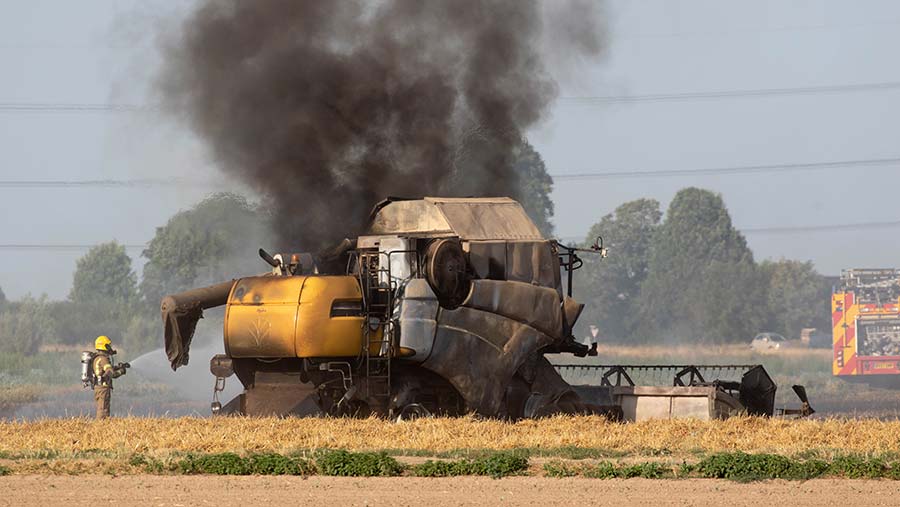Cost of farm fires shot up 40% in 2020 to £69m
 © Tim Scrivener
© Tim Scrivener Farmers have been urged to check electrical equipment regularly and have fire plans in place after new figures showed the cost of farm fires shot up 40% in 2020 to £69m.
Agricultural vehicle fires accounted for an additional £20m of claims last year, according to rural insurer NFU Mutual.
See also: How to protect your farm from fire risk and stay legal
Electrical faults were a major cause of fires, and extreme weather and dry conditions also contributed to the huge rise in the cost and number of fires in 2020.
Farmers have been advised to book regular inspections by an electrician and keep control panels and electric consumer units clean.
More fires involving biomass boilers last year prompted a warning from NFU Mutual about proper service and maintenance, along with good waste disposal to help reduce risks of a blaze breaking out.
Farm safety adviser Evita Van Gestel, from the insurer’s Risk Management Services, said: “Most fires are preventable by carrying out routine maintenance and inspection on heating systems, electrical installations and machinery, and controlling hot works within farm workshops.
“Implementing and maintaining good standards of housekeeping, particularly around the storage of combustibles and flammables such as hay, straw and fuels, will also reduce the risk of a fire spreading.”
The East was the worst-affected region by cost in 2020, totalling £21.5m, followed by Northern Ireland, where fire claims cost £14.7m (up from £2.7m in 2019).
In the South West, claims reached £8m, up from £5.9m in 2019.
NFU Mutual farm fire claims by area |
|||
|
Region |
2020 |
2019 |
Change |
|
East |
£21.5m |
£7m |
209.4% |
|
Midlands |
£5.2m |
£13m |
-61% |
|
North East |
£7.7m |
£7.6m |
2.1% |
|
North West |
£1.1m |
£1.6m |
-30.4% |
|
Northern Ireland |
£14.7m |
£2.7m |
445.5% |
|
Scotland |
£3.3m |
£2.8m |
19% |
|
South East |
£5.4m |
£5m |
7% |
|
South West |
£8m |
£5.9 |
35.8% |
|
Wales |
£2.1m |
£3,200,000 |
-35.2% |
|
Total |
£69m |
£49.1m |
40.5% |
Five fire safety tips
- Have a plan in place Make sure everyone knows what to do if a fire starts. The top priority is evacuating people safely
- Do not mess with electrics Don’t try to carry out electrical work yourself, and always used a qualified and competent electrician for work and inspections
- Suppress the risk Fire suppression systems, used to extinguish or control a fire and activated by heat and smoke, can save lives and property
- Keep on top of housekeeping Store materials and machinery correctly to eliminate dust and debris. Keep electrical units clean and be aware of “hostile conditions” – wet, damp or acidic atmospheres
- Control hot work If work can’t be done outside, ensure the area is well away from combustible materials. Anyone carrying out hot works on your farm should be subject to a strict Permit to Work system
